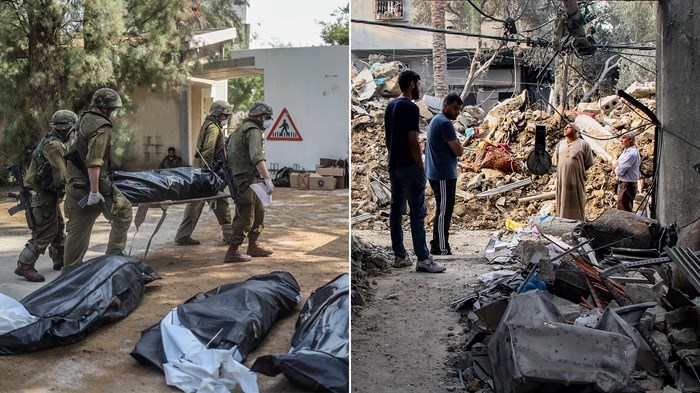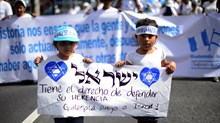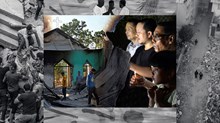
With at least 1,200 Israelis and 1,100 Palestinians slain, it is not simply the Israel-Hamas war’s stunning casualty total that has outraged the world, but also the brutality of Hamas.
More than 200 youth were killed at a concert festival, villages and farms were raided and terrorized, and an estimated 150 hostages have been threatened with death if Israeli air strikes on the coastal strip do not cease.
With such cessation unlikely, casualty numbers will most assuredly increase.
Israel has called up 360,000 reservists, poised to begin a ground campaign into Gaza. Consistent with military strategy to meet terrorism with overwhelming force, past conflicts in the beleaguered 25-mile strip have previously produced striking totals, including 2014 clashes that resulted in 73 Israeli and 2,100 Palestinian deaths.
All the while, many Israelis have lived in fear. Since the September 2005 unilateral Israeli withdrawal from Gaza, the Jewish Virtual Library has counted 334 terrorism deaths and at least 20,648 rockets and mortars launched into Israeli territory.
Amid the stark tallies, there are signs of balance between local believers across the ethnic divide. Christianity Today interviewed three Messianic Jews, three Palestinian evangelicals, and two Gazan Christians currently outside their native strip.
Shared astonishment
“The level of hatred and evil displayed in these acts is truly shocking,” said Eli Birnbaum, a branch director for Jews for Jesus in Tel Aviv and Jerusalem. “It is unlike anything we have seen in decades and has deeply shaken the population.”
Attacks in his neighborhood have been so intense, he said, that people are remaining indoors. In constant communication with family, friends, and 50 full-time staff members, he said his community is doing its best to stay connected and offer encouragement.
On the Saturday of the attack, Birnbaum’s congregation came together to pray. Unsure of what to do, they distributed prayer sheets for the safe return of hostages. Some members simply lit candles.
Jews for Jesus collected supplies for displaced families and soldiers at the border.
At least one Messianic Jew has died for his nation. David Ratner was called a war hero by his commander, saving the lives of five fellow soldiers as their post was stormed by 400 Hamas fighters. Shot in the neck, he continued in combat for the next eight hours.
Birnbaum counseled his children to stand strong against the desire for hatred. He challenged Israelis to seek justice without vengeance. And he asked everyone to remain genuinely concerned for Jew and Palestinian alike—while praying for Gaza and its liberation from Hamas.
“What can we do to represent the Lord as our nation is in crisis?” he asked. “Please pray for us, that we choose wisely how to shine his light in a very dark place right now.”
Grace Al-Zoughbi, a Palestinian theological educator, is also searching for his light.
“The church is trying to cling to any glimmers of hope it can find,” she said. “The situation is deeply disturbing, the atrocities appalling.”
She also was shocked by rocket fire, landing from the opposite direction near her home in Bethlehem. Families rushed to the grocery store to stock up on goods, fearful of escalation. Representative of an already struggling population under lockdown, she said the loss of tourism will further devastate the economy as the church seeks to help as much as possible.
Its immediate reaction was fervent prayer to end the conflict.
“Lord, take all the evil, smash it as glass, and grind it to nothing,” Al-Zoughbi pleaded. “In this we hold our hope, that one day soon your ways will prevail.”
She asked believers on both sides to be peacemakers. She asked international Christians to avoid “evil misrepresentations.” And for herself, she focused on Psalm 122: Pray for the peace of Jerusalem. May all who love you be secure.
Shared distance
Hanna Massad, the former pastor of Gaza Baptist Church, turned himself to the terse psalm that follows: Have mercy on us, Lord, have mercy on us, for we have endured no end of contempt (123:3).
Following 30 years of service as the first locally born pastor, Massad left after the 2007 violence that included attacks on his church and the kidnapping and murder of a youth worker in the affiliated Christian bookstore. He has experienced militancy firsthand, and understands the Israeli fear.
Now a United States citizen, in addition to weekly trauma counseling over Zoom and near daily interaction with church members, he takes three trips a year back to Gaza for aid distribution and overall encouragement.
His last visit ended two weeks ago, with slightly better Israeli treatment than normal, he says. Seeking reciprocity with the US for visa-less entry, border authorities have smoothed procedures for dual US-Palestinian citizens. Coming through Jericho, the security wait was only one hour this time.
“We are not treated with common dignity,” Massad said, “but according to the document we carry.”
For most Palestinians, he continued, it is with humiliation. Under blockade since 2007, 50 percent of the population of Gaza is unemployed, 65 percent live below the poverty line, and only 17,000 of 2.3 million people are allowed to seek work in Israel. The number vacillates according to changing policy, and their checkpoint treatment is far more intense. The rest are stuck.
“It is a big prison,” Massad said. “And usually, every visit finds things a little worse than before.”
And now with the war, Israel has stated it will cut off Gaza’s electricity and water supply. The frustration accumulates; while his father once hoped for a Palestinian state, Massad said he is now age 60 and wonders if it will ever happen. But local Christians do not support violence from either side.
“This is not the dignity we are looking for,” Massad said. “Our example is Jesus. And whenever anyone truly encounters him, God fills that heart with love for all humanity.”
Even when one’s home is destroyed.
Fellow Gazan Khalil Sayegh’s family apartment was hit by an Israeli rocket. They now take refuge in one of the strip’s three churches, displaced along with 250,000 others sheltered in schools or other facilities. The World Health Organization called for the establishment of a humanitarian corridor.
“They barely made it out,” he said, “assuming that home was their safest option.”
Currently in the US, Sayegh is part of the Agora Initiative to work jointly with other Palestinians and Israelis to promote a culture of constitutional democracy. He said he was pleased to see Americans condemn Hamas’s attacks. At the same time, he says he felt disappointed that his people’s suffering was so easily dismissed.
Sayegh’s biblical text of comfort is Psalm 73, where the psalmist nearly gives into his envy of the prosperous wicked: You destroy all who are unfaithful to you. But as for me, it is good to be near God. I have made the Sovereign Lord my refuge.
And in this peace, his message is clear.
“Do not give into hate, tribalism, or revenge,” Sayegh said. “Work hard to end not only this bloody round of violence, but the structural injustice of the occupation, so that we may live in peace.”
Shared anger
Jaime Cowen, a Messianic Jewish lawyer, is incensed at structural changes threatening Israel that preceded the war. Since his return as prime minister with a far-right coalition that includes former Jewish terrorists, he said, Benjamin Netanyahu has divided the country by trying to upend Israel’s judicial system.
And while trying to portray himself as a peacemaker with the greater Arab world, Netanyahu further inflamed the marginalized Palestinian community at home by authorizing more illegal settlements.
“Something was bound to give, and this time it did,” Cowen said in a video statement. “This is a very dangerous time for the country.”
He prays for the quick defeat of Hamas, which may have been motivated to thwart Netanyahu’s outreach to Saudi Arabia. But the real threat lies to the north, he said, with Hezbollah’s thousands of precision missiles ready to reach the farthest Israeli cities. Once this war is over, Cowen wants the government to resign and a commission to determine what caused this administration’s “colossal” failures in intelligence and military preparedness.
“Until then, there is deep sadness and anger,” he said, “over the horrific loss of life in innocent Jewish families.”
Palestinian evangelicals have volunteered to help. The Convention of Evangelical Churches in Israel announced that any displaced Messianic believer is welcome to stay with its member families.
“What can we as Arab Palestinian Christian citizens of Israel provide in a time like this?” the convention’s chairman, Botrus Mansour, preached at his church in Nazareth. “The answer is Jesus.”
From his safe northern locale—needing only to verify his shelter is ready—he was planning a message on church governance before the war shifted his focus. Much of the service was spent in prayer, and he encouraged the faithful with a quote from Francis of Assisi: Make me a tool for your peace. Despite the difficult feelings within them, Christians must be peacemakers.
Even as they fume—in multiple directions.
“People are angry about the brutal attack of Hamas,” said Mansour. “But they also feel that violence will continue as long as there is no just solution to the conflict.”
Like Cowen, he prays that God will replace current leaders. And he also shares a common comforting scripture, Lamentations 3:22–23: Because of the Lord’s great love we are not consumed, for his compassions never fail. They are new every morning; great is your faithfulness.
Shared gospel
“Nothing about this situation is right or good,” said Lisa Loden, a Messianic Jewish member of the Bethlehem Institute of Peace and Justice. “But there is a strong desire to see the Lord use these events to draw people to himself.”
Living in the coastal city of Netanya, north of Tel Aviv, Loden co-leads a believing congregation that has already organized many prayer gatherings since the war began. They asked God’s mercy on civilians in both Israel and Gaza. They prayed for their leaders, the hostages, and those who lost loved ones.
They prayed for a quick end to the conflict, for justice, and for Christians on both sides not to disengage from each other. She also issued a plea to believers around the world, watching on.
“Do not quickly take a side,” Loden asked. “But enter into real dialogue and seek a solution to this intractable conflict.”
From Ramallah, pastor Munir Kakish, president of the Council of Local Evangelical Churches in the Holy Land, spoke similarly.
“Pray for both sides,” he said. “We cannot see his purposes, but he is sovereign.”
His church was full, as he gave his stressed congregation a message on prayer accompanied by hymns that emphasized the peace of God. Some families emigrated from Gaza and are worried about their relatives who remain.
In the meantime, afraid an Israeli incursion into Gaza will trigger a West Bank uprising and a subsequent city-wide lockdown, Kakish also made sure to stock up on goods and worked with a local grocer to prepare food packages.
There may be many casualties to come.
But his final word concerned geography. The fight for territory misses the point.
“If either side takes land from the Mediterranean all the way to the Pacific, but does not have Jesus, it is nothing,” he said. “They still need Jesus.”
Jeremy Weber contributed additional reporting.

Support Our Work
Subscribe to CT for less than $4.25/month
















